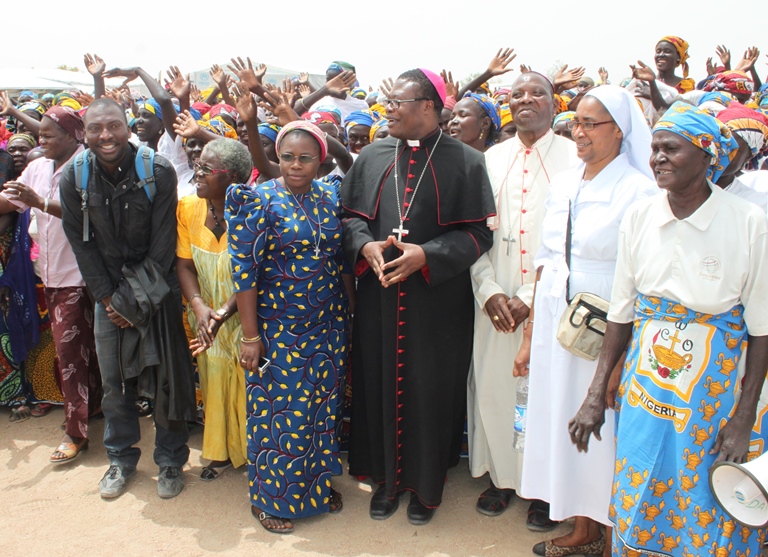|
Human chain protects worshippers from Boko Haram attacks in Cameroon
Saturday, October 3, 2015
"Life is too dangerous there for people with white skin."
By Antonia von Alten
NEW
YORK—Last July, Boko Haram suicide attacks killed more than 30
people and injured hundreds in the town of Maroua, Cameroon. In the wake of
that violence, the open-air celebrations of Mass in the Diocese of Maroua-Mokolo
are surrounded by a human chain protecting congregations as large as 3,000.
Despite the fear of terrorism, Bishop Bruno Ateba told international Catholic
charity Aid to the Church in Need, the people have retained their sense of joy:
“We like to sing and dance during Holy Mass, for the Lord is our refuge,” the
prelate said, adding: “We feel as though it is Good Friday. Yet we are not
giving up hope.”
Boko
Haram is stalking Cameroon, especially in the northern region close to Nigeria.
On Sept. 3, 2015, two women blew themselves up in a crowded market place,
causing a bloodbath.

Bishop
Ateba reported that there are more than a 100,000 people in the area who have
been driven from their homes. Half of them—mostly refugees from Nigeria—are stranded
in a camp some 25 miles from Maroua. Some 50,000 Cameroonians have been driven
from their home; most have sought refuge with relatives or found shelter in public
building.
The
bishop has withdrawn foreign missionaries from the frontier region. “Life is
too dangerous there for people with white skin,” he said, adding that tourism,
an important source of income for the region, has also taken a hit. “We‘ve been
brought to a standstill,” he said, calling on especially on the West to “help
us to achieve peace. Without peace we can do nothing. The international
community has all the resources to put an end to the terrorism of Boko Haram.”
To
ultimately stop Boko Haram, said the bishop, dialogue between Christians and
Muslims is essential. The Catholic Church has a good reputation in Cameroon,
where 70 percent of its population of 20 million people are Christians; Muslims
account for about a fifth of the population. The bishop said that Muslims make
regular use of Catholic health centers and also send their children to Catholic
schools.
In 2014, Aid to the Church in Need (ACN) spent more
than $1M in support of the pastoral mission of the Church in Cameroon,
including the training of seminarians in the Diocese of Maroua-Makolo. A big
project underway is the construction of a cathedral in Maroua. ACN recently helped
build a multi-purpose hall close to the refugee camp outside Maroua, where
Catholic refugees can come for prayer and Mass.
Bishop Atebo among the faithful; ACN photo
|